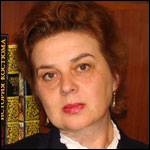The right you go - you find an Orthodox Church, the left you go - you find a mosque, directly you go - you get into the Karaite kenasses. I recollected this beginning of Russian fairy tales when I was on holiday in Eupatorium. On a small platform in 100 meters one from another there was a church and a mosque, and in two-three quarters there were kenasses - temple constructions of the Crimean Karaites. In the morning the Orthodox under loud rings went to church, and late at night the Mullah last time for this day proclaimed something for devout Muslims, and his voice spread over the resort town.
However, such an intense sound background did not afflict me, but on the contrary. It was felt that you live not only in ancient - more than 2000 years-old - city, but also in the original centre of religious culture. Journalistic eagerness did not give possibility to have a rest from a favorite work, and I went on "hunting" for information.
I visited an Orthodox Church, lighted a candle, sincerely prayed, and then asked attendants, whether Muslims disturb them, whether there are conflicts on religious or ethnic ground. "God forbid, why we should be enemies?" was filled with indignation the woman selling candles and religious literature. – "They live together, we live together, and our people come here, theirs to the mosque. And everything is calm. You'd better watch the TV and read newspapers lesser, there all lies..." she advised me. Such a characteristic of our mass media did not please me. But, nevertheless, the madam is right...
Excursions in the mosque were carried for all comers every hour, despite how many people came, 20 or jut two. The guide - the young man with a correct pronunciation and uncommon intelligence - in details and interestingly told about historical events in Crimea and the world, about constructed in the 16th century Eupatorium mosque and its history. On my question, "Were there any conflicts on religious ground for years of independence of Ukraine?" he accurately and unambiguously answered, "No! Everything is organized by politicians!" Someone from tourists asked, "And you may go on Jihad, is it so?" And here we listened to a mini-lecture which was not planned for the excursion.
Jihad has four levels. The first is a struggle against our own drawbacks and improvement of oneself. The second is diligence on the way to God: self-education, the Quran studying, charity to the poor, help to the weak, old men, and children. The third is an indispensable pilgrimage to the holy Makkah which every believer should perform at least once in a life-time. At last, the fourth level is protection of religion and belief against those who try to offend Islam. And then I heard from the guide, "What they write in newspapers? "Islamites-bombers declared Jihad..." We never welcome bombers. Suicide in Islam is considered as one of the grave sins. And journalists often use the word "Jihad", without understanding its sense".
… Kenasses amazed me with calmness and cleanliness which is possible only in a place where there lives wisdom of centuries. These are not just pathos words, it is really felt. The head of the Karaites of Crimea, Victor Zaharovich Tiriyaky, even did not wish to hear about collisions on religious ground in Crimea - there are no conflicts. Again, he is sure that they are inflated by politicians and journalists.
So they think of us, respected journalists. We do not know an essence, we write only that, what we grasped in a fast and inattentive glance, religious problems are considered through a prism of stereotypes, and a current state of problems we disclose from positions of an editorial policy which is ordered by those who pay... Is there a way-out? There is, I believe. First is to study. To learn more about religions of Ukraine (even of the world, what is better). Secondly, to specialize. That publications in mass media about religion should not be prepared today in culture department, tomorrow in political, and the day after tomorrow - in sports department, if there is no work at that time. Eventually, to be tolerant to all religions and beliefs. Or should it be first?
Alla BOYKO, the Doctor of Philology, the professor of the Institute of Journalism of the National Taras Schevchenko University of Kiev, the expert on religious journalism.
By RISU
Related Links:
A Civilisational Dialogue in The Crimea



